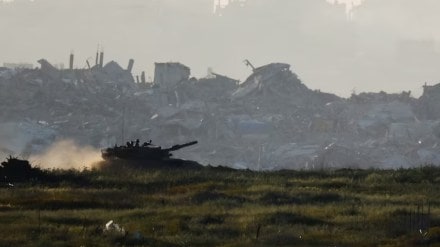Israel has intensified its military offensive in Gaza, following a series of air strikes that the Hamas-run health ministry claims have killed over 430 people in two days. The Israel Defense Forces (IDF) stated that troops have advanced up to the Netzarim Corridor, a strategic point that divides the north and south of the Gaza Strip.
This renewed military action marks the collapse of the fragile ceasefire that had been in place since January. Israeli air strikes and ground troop movements signal a significant escalation in the conflict.
UN compound hit by explosion
An explosion at a United Nations compound in Deir al-Balah resulted in the deaths of two people, including a UN staff member. While the Israeli foreign ministry has denied responsibility, it has promised an investigation. The UN Office for Project Services (UNOPS) reported that explosive ordnance had hit the building, which was located in an isolated area.
The IDF has issued multiple evacuation orders in areas it is moving into, such as Beit Hanoun in northern Gaza. It has also warned residents to leave vast areas along the land borders, suggesting that a broader ground offensive is imminent. The orders have triggered panic among Palestinian families, many of whom had just returned home after earlier displacement. People are fleeing by foot, cart, and vehicles to seek safer locations.
Israel issues ‘last warning’
Israeli Defence Minister Israel Katz, in a video statement, issued what he described as a “last warning” to Hamas, demanding the return of hostages and the dismantling of the militant group. He warned that failure to comply would result in “total destruction and devastation.” Israel says Hamas is still holding 59 hostages, 24 of whom are believed to be alive.
Following the explosion at its compound, UN Secretary General António Guterres has called for a thorough investigation. Jorge Moreira da Silva, head of UNOPS, claimed the incident was not accidental and described the humanitarian situation in Gaza as “unconscionable.”
Ceasefire negotiations collapse
On Tuesday, Israeli Prime Minister Benjamin Netanyahu declared that Israel had “resumed combat in full force,” saying any further ceasefire talks would now occur “under fire.” The current round of air strikes is the heaviest since the ceasefire and hostage exchange deal began on 19 January. Negotiations to extend the truce faltered as Hamas refused Israel’s terms, although it had offered to release a living American hostage and the bodies of four others.
Israel has blocked the entry of food, fuel, and medical supplies into Gaza since early March, aiming to pressure Hamas into accepting a new ceasefire agreement backed by the United States. The ongoing military campaign demonstrates Israel’s intent to escalate pressure on Hamas through force if diplomatic efforts fail.
Background of the conflict
The latest escalation stems from Hamas’s 7 October 2023 attack on Israel, which killed around 1,200 people and resulted in the capture of 251 hostages. During the first phase of the ceasefire, 25 hostages were released alive. In retaliation, Israel launched a sweeping military operation. According to the Hamas-run health ministry, over 48,500 Palestinians have been killed so far, with vast destruction of homes and infrastructure across Gaza.
